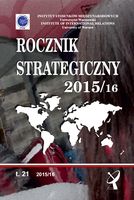Europa Wschodnia i Kaukaz Południowy - Désintéressement Unii Europejskiej, Désintéressement Rosji?
EASTERN EUROPE AND SOUTHERN CAUCASUS: BOTH THE EU AND RUSSIA SHOW THEIR DÉSINTÉRESSEMENT?
Author(s): Andrzej SzeptyckiSubject(s): Politics / Political Sciences, Politics, International relations/trade
Published by: Wydawnictwo Naukowe Scholar Sp. z o.o.
Keywords: Krym po aneksji; konflikt w Donbasie; wybory prezydenckie na Białorusi; wybory parlamentarne w Azerbejdżanie; wybory samorzadowe na Ukrainie
Summary/Abstract: In 2015 the situation in the region was characterized by three phenomena. First,if in 2014, after the annexation of the Crimea and the beginning of the Russian--Ukrainian war in the Donbas, the region was in the spotlight of international attention,in 2015 the interest largely declined – mainly because of the internationalizationof the civil war in Syria and its consequences (the refugee crisis, terrorist attacksin France). In the short term, the predictions that another post-Soviet countrymay fall victim to the Russian aggression proved to be untrue.Second, most of the countries in the region had to face economic problems dueboth to the lack of internal reforms and the current state of the world economy, inparticular the recession in Russia. These problems considerably destabilized someof the East European and South Caucasus states, even if, often as a result of electoralfrauds, the existing political regimes remained in power.Third, the geopolitical orientation of the East European and South Caucasus states,traditionally divided into ‘pro-Western’ (Ukraine, Georgia, and Moldova, which hadsigned association agreements with the EU in 2014, as well as the authoritarianAzerbaijan, rich in oil and gas) and ‘pro-Russian’ (Belarus and Armenia, whichjoined the Eurasian Union) remained uncertain. Despite a progressive rapprochementwith the EU, the political situation in Ukraine, Georgia, and Moldova was unstable.Azerbaijan strengthened its ties with Russia, fearing a Western-sponsored‘colour revolution’, while Belarus opted for a ‘thaw’ with the EU in order to avoidoverdependence on Russia.In the past, it might have seemed that a rapprochement with the EU would bringmodernization and prosperity, while close ties with Russia and/or the “petro-economy”would at least guarantee the survival of the regime in power, the year 2015proved that these hopes were too optimistic. Due to their internal weakness, thecountries of the region were unwilling or incapable to carry on fundamental reforms,while the European Union and Russia proved unable to provide them with a trulyattractive and credible offer. As a result, the countries in the region (with the exceptionof Ukraine) opted for a „multi-vector” policy, seeking to maximize short-termbenefits from the cooperation with their two big neighbours.
Journal: Rocznik Strategiczny
- Issue Year: 2015
- Issue No: 21
- Page Range: 245-263
- Page Count: 19
- Language: Polish

